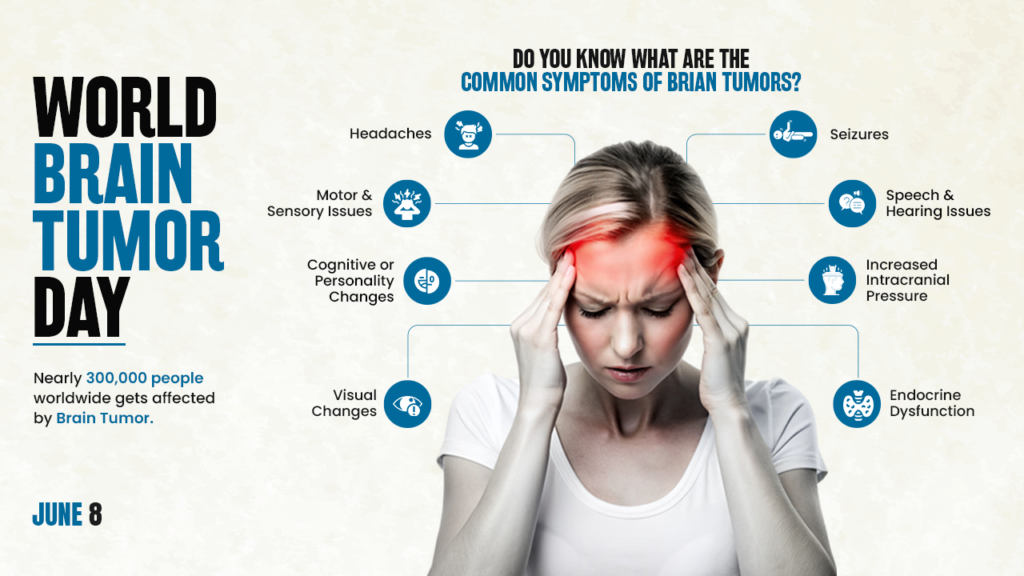World Brain Tumor Day: Raising Awareness and Hope

Understanding Brain Tumors Brain tumors, which can be either malignant (cancerous) or benign (non-cancerous), affect thousands of individuals worldwide each year. According to the World Health Organization (WHO), brain and central nervous system tumors account for approximately 2% of all cancers globally, with nearly 300,000 new cases diagnosed annually. These tumors can significantly impair cognitive and physical functions, impacting quality of life and requiring comprehensive medical care. Symptoms and Diagnosis Symptoms of brain tumors can vary widely depending on the tumor’s size, location, and growth rate. Common symptoms include persistent headaches, seizures, vision or hearing problems, and changes in behavior or cognitive abilities. Early diagnosis is critical for effective treatment. Diagnostic tools such as MRI, CT scans, and biopsies are employed to accurately identify and assess brain tumors. Treatment Options Treatment for brain tumors typically involves a combination of surgery, radiation therapy, and chemotherapy. Advances in medical technology have led to more precise and less invasive surgical techniques, improving outcomes for many patients. Additionally, targeted therapies and immunotherapies are being explored as promising treatment options, aiming to attack cancer cells while sparing healthy tissue. Support and Resources Support for brain tumor patients and their families is crucial. Organizations such as the American Brain Tumor Association and Brain Tumour Foundation of Canada provide resources, support groups, and educational materials to help patients navigate their diagnosis and treatment journey. Emotional and psychological support, along with practical assistance, can significantly enhance the quality of life for those affected. Conclusion World Brain Tumor Day highlights the critical need for awareness, research, and support for brain tumor patients and their families. However, by recognizing the challenges faced by those affected and advocating for increased funding and research, a future with better treatment options and improved outcomes can be envisioned. Collective efforts can make a significant difference in the lives of individuals battling brain tumors, offering them hope and a chance for a brighter future.
The Importance of Embracing Home Health Care Services

In today’s fast-paced world, prioritizing health care has become more crucial than ever. With the rise of chronic illnesses and an aging population, the demand for accessible and personalized health care solutions is on the rise. Home health care services stand at the forefront, offering a compassionate and tailored approach to meeting individuals’ unique needs in the comfort of their own homes. The Rise of Home Health Care In recent years, home health care has gained significant traction as a viable alternative to traditional hospital or clinic-based care. It offers a personalized approach to healthcare delivery, allowing individuals to receive medical attention and support services in the comfort of their own homes. Understanding the Need The significance of home health care services cannot be overstated, especially when considering the diverse needs of individuals across different age groups and health conditions. From seniors requiring assistance with daily activities to patients recovering from surgeries or managing chronic illnesses, the spectrum of individuals benefiting from home health care is vast. Catering to Diverse Needs One of the most significant advantages of home health care is its ability to cater to a wide range of needs. From post-surgery recovery to chronic illness management, home health care services encompass various medical and non-medical assistance. Whether it’s administering medication, wound care, physiotherapy, or simply companionship, skilled professionals ensure that every aspect of a patient’s well-being is addressed comprehensively. Promoting Independence and Dignity Beyond addressing medical needs, home health care promotes independence and dignity. For many individuals, the familiarity and security of their home environment play a crucial role in their recovery journey. By receiving care at home, patients maintain a sense of control over their lives, empowering them to participate actively in their treatment and daily routines. This holistic approach to care promotes not only physical health but also mental and emotional well-being. Enhanced Quality of Life Home health care goes beyond mere medical intervention; it enhances the overall quality of life for patients and their families. By eliminating the stress and inconvenience of frequent hospital visits, it allows individuals to focus on healing and enjoying meaningful moments with loved ones. Moreover, the emotional support provided by caregivers fosters a sense of companionship and belonging, mitigating feelings of loneliness and isolation. Cost-Effective and Efficient In addition to its numerous benefits, home health care proves to be a cost-effective and efficient healthcare solution. By reducing hospital readmissions and minimizing the need for prolonged institutional care, it alleviates the financial burden on patients and healthcare systems alike. Furthermore, with advancements in technology, remote monitoring and telemedicine services further streamline the delivery of care, ensuring timely intervention and proactive management of health conditions. Conclusion In conclusion, home health care services play a pivotal role in today’s healthcare landscape by offering a human-centric approach to meeting individuals’ diverse needs. From enhancing independence to improving health outcomes, the benefits of home-based care are vast and undeniable. By embracing these services, individuals can receive the support they need while maintaining their sense of dignity and autonomy. Let’s prioritize our health and well-being by embracing the comfort and convenience of home health care services.
